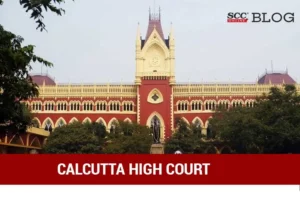Calcutta High Court: In an appeal against the judgment and order passed on 08-06-2021, by Single Judge under Section 34 of the Arbitration and Conciliation Act, 1996 (the Act), a division judge bench comprising of Siddhartha Roy Chowdhury* and Soumen Sen, J., held that the landlord-tenant disputes fall under the West Bengal Premises Tenancy Act, 1956 making it non-arbitrable. The Court sets aside the judgment and the arbitral award, concluding that the dispute is beyond the scope of the Act.
Brief Facts
In the instant matter, on 01-12-1982, through a registered lease deed, the appellant became the lessee of a property for 15 years. Upon the expiration of the lease in 1997, the lessor, invoking an arbitration clause in the lease deed, initiated arbitration proceedings resulting in an award on 21-04-2019, directing the lessee to vacate the premises. The lessee attempted unsuccessfully to reverse the award through a Section 34 application under the Act, leading to the present appeal.
Parties’ Contentions
The appellant contended that the dispute is essentially a landlord-tenant matter, subject to the West Bengal Premises Tenancy Act, providing statutory protection to tenants. It was argued that disputes governed by rent control legislation, like the West Bengal Premises Tenancy Act, are non-arbitrable. The appellant challenged the jurisdiction of the arbitrator, claiming the award, issued after the arbitrator’s mandate expired, violates statutory provisions and the NBCC Ltd. v. J.G. Engineering (P) Ltd., (2010) 2 SCC 385.
The respondent argued that the appellant’s attempt to establish premises tenant status under Section 21 of the West Bengal Premises Tenancy Act was rejected by the competent authority. The respondent asserted that the appellant, having accepted the verdict of the statutory authority, is estopped from claiming tenancy governed by the Rent Act. The respondent contended that the arbitrator’s jurisdiction continued post-expiration due to the appellant’s counterclaim and participation in the arbitration process.
Court’s Analysis
The Court examines whether the dispute falls under the Transfer of Property Act, 1882, or the West Bengal Premises Tenancy Act, 1997 or 1956. The Court examined the nature of the lease and its termination, leaning towards it being a tenancy under the West Bengal Premises Tenancy Act.
Analysing Section 3 of the West Bengal Premises Tenancy Act, the Court concluded that the that disputes subject to specific statutes, like rent control laws falls under the Act’s purview, making it non-arbitrable. Citing Vaidya Drola v. Durga Trading Corpn., (2021) 2 SCC 1, the Court held that landlord-tenant disputes under the Transfer of Property Act are arbitrable, but under rent control legislation, they are not. The Court dismissed the challenge to the arbitrator’s jurisdiction, citing the principle that the Arbitral Tribunal is the primary authority to decide issues of non-arbitrability.
Court’s Decision
The Court held that the subject matter falls outside the ambit of the Act. The appeal is allowed, and the impugned judgment and award are set aside. No costs are awarded.
[Amstar Investments (P) Ltd. v. Shree Shree Iswar Satyanarayanjee, 2023 SCC OnLine Cal 4814, order dated 05-12-2023]
*Judgment by Justice Siddhartha Roy Chowdhury
Advocates who appeared in this case :
Mr. Joy Saha, Sr. Adv., Ms. Urmila Chakraborty, Mr. Ishaan Saha, Mr. A. Choudhury, Ms. Meera Agarwal, Counsel for the Appellant
Mr. Ashoke Banerjee, Sr. Adv., Mr. Sakya Sen, Mr. Animesh Paul, Ms. Sormi Dutta, Ms. Haardikaa Rajder, Counsel for the Respondents

